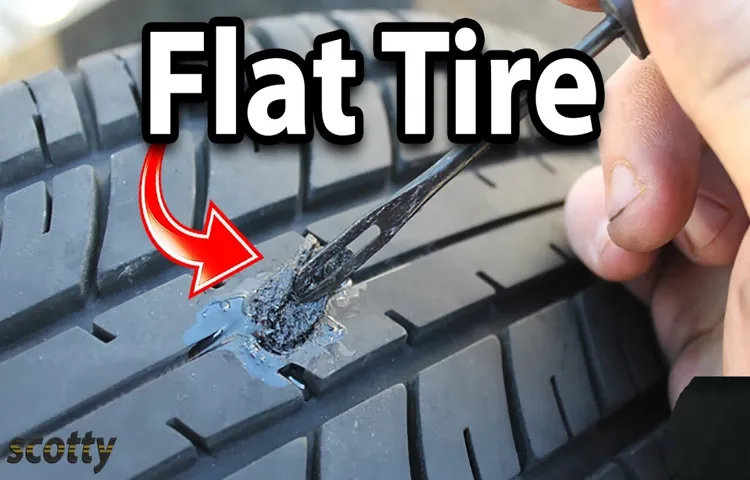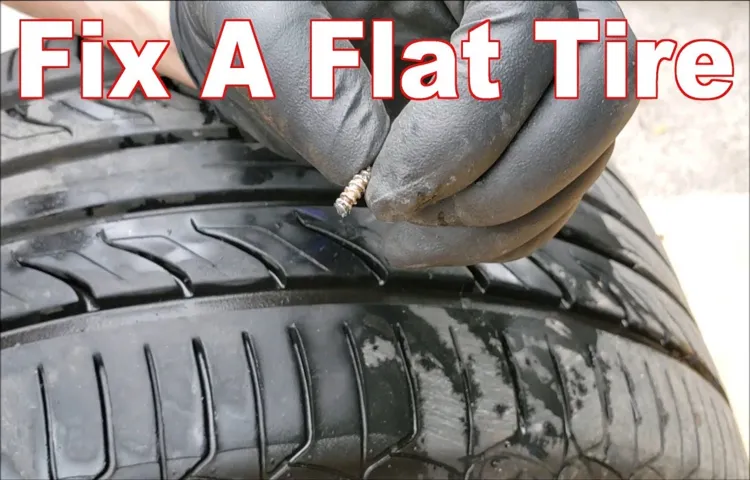Have you ever been on the road, riding smoothly on your vehicle when all of a sudden, you heard a loud popping noise? Your heart starts racing as you realize it’s your tire that just got a flat. As frustrating as it may seem, it’s an inevitable occurrence for most drivers. Flat tires can happen at any time and to anyone, leaving you stranded on the road with no clue on what to do.
But have you ever thought about the cost of fixing a flat tire? Although it may seem like a minor inconvenience, the cost of fixing a flat tire can accumulate over time. Many people make the mistake of neglecting the issue and continue to drive with a deflated tire, not knowing the potential damage it can cause to the tire, rim, or even the suspension of your vehicle. This can lead to more expensive repairs in the long run.
So how much does it actually cost to fix a flat tire? The cost varies depending on the severity of the damage and the type of tire. In most cases, repairing a flat tire can cost anywhere between $15 to $30, while replacing it can cost $50 to $100 or more. It’s important to note that the cost may increase if you have specialized tires or if the damage is significant enough to require additional repairs.
While it may be tempting to continue driving on your flat tire to avoid the cost of repair, it’s important to prioritize your safety and the safety of others on the road. Driving on a deflated tire can cause serious accidents and put you at risk of a blowout. In the end, the cost of fixing a flat tire is a small price to pay for your safety and the wellbeing of your vehicle.
Table of Contents
Understanding the Issue
If you’re faced with a flat tire, you might be wondering how much it will cost to fix it. Well, the answer varies depending on a few factors. First of all, the type of tire you have will affect the cost.
For example, a high-performance tire is typically more expensive to replace than a standard all-season tire. Additionally, the severity of the damage will play a role. If the tire can simply be patched up, it will be less expensive than if it needs to be replaced entirely.
The location you’re in and the shop you take your tire to also make a difference in cost. It’s always a good idea to call around for estimates before selecting a tire shop. On average, fixing a flat tire can cost anywhere from $20 to $50 for a simple patch job, and between $100 and $300 for a new tire.
Don’t forget to factor in the cost of labor as well. It’s important to address a flat tire as soon as possible to avoid further damage, so don’t hesitate to take it to a professional for repair.
Causes of Flat Tires
Flat tires are a common and frustrating issue for drivers. There are several causes of flat tires, and it’s important to understand the issue in order to prevent it from happening in the future. One main cause of flat tires is punctures from sharp objects on the road, such as nails or screws.
These objects can become lodged in the tire and cause it to lose air over time. Another cause of flat tires is a leak in the valve stem, which can allow air to slowly escape from the tire. Over time, this can cause the tire to become completely flat.
Additionally, over-inflation or under-inflation of tires can lead to uneven wear and tear, which can ultimately lead to a flat tire. Regularly checking tire pressure and ensuring it is at the recommended level can help prevent this from happening. By understanding these causes, drivers can take the necessary precautions to avoid flat tires and keep themselves safe on the road.

Symptoms of a Flat Tire
A flat tire can be a headache for anyone, and it can happen at any time. Understanding the symptoms of a flat tire is crucial to prevent further damage to your vehicle. Some indicators of a flat tire include difficulty steering your car, a wobbly or shaky feel, or a thumping sound while driving.
You may also observe decreased fuel economy or a low tire pressure warning light on the dashboard. Ignoring these signs can cause the tire to burst, resulting in a loss of control over the vehicle. In such a situation, it is best to pull over to a safe place immediately and inspect your tires.
It’s critical to regularly check your tires’ condition and ensure they have sufficient air pressure to prevent a blowout while driving. Remember, taking action at the first sign of trouble can help avoid expensive and dangerous consequences down the line.
Factors that Affect the Cost
If you’re wondering how much it costs to fix a flat tire, it really depends on a number of factors. For starters, the type of vehicle you have can impact the cost, as larger vehicles often require larger and more expensive tires. The size of the tire also matters, as larger tires will generally cost more to replace than smaller ones.
Additionally, the severity of the damage to the tire can affect the cost, as minor punctures may be repairable while more serious damage may require a full replacement. Other factors that can impact the cost include the cost of labor and the location of the repair shop. All in all, the cost to fix a flat tire can vary widely depending on a number of different variables, so it’s important to do your research and shop around for the best deal.
Type of Tire
When it comes to buying new tires for your vehicle, one factor that can significantly affect the cost is the type of tire you choose. There are various types of tires available in the market, each designed for different driving conditions and preferences. For instance, all-season tires are a reliable option if you live in an area with mild weather conditions.
They provide a comfortable and smooth ride, are fuel-efficient, and have a longer lifespan compared to other tire types. On the other hand, if you live in a region with snowy or icy conditions, you might require winter tires that are specially designed to provide better grip and traction on slippery roads. These tires are costlier than all-season tires but can provide better safety on treacherous road conditions.
Additionally, other factors such as brand, size, and quality of the tire can also influence the overall cost. Therefore, before selecting a tire, it’s essential to consider your driving conditions, budget, and requirements to make an informed choice about the type of tire that’s best for you.
Severity of Damage
When it comes to repairing damage to your property, the severity of the damage will ultimately affect the cost. This is because the more severe the damage, the more time and materials are required to fix it. For example, a minor leak in your roof may only require a few patches and a small amount of paint, while major water damage may require tearing out floorboards, walls, and ceilings in order to properly clean and repair.
Additionally, the type of damage also plays a role in pricing. For example, fire damage may have a higher cost than water damage due to the hazardous materials and specialized equipment needed for cleanup and restoration. It’s important to keep in mind that the cost of repairing damage is also influenced by factors such as location, accessibility, and the extent of the damage.
So, if you’re dealing with unexpected damage to your property, it’s important to assess the severity and type of damage in order to get an accurate estimate for repairs.
Vehicle Type and Size
When it comes to shipping a vehicle, one of the most important factors that affects the cost is the type and size of the vehicle. Larger vehicles will generally cost more to ship than smaller ones due to the additional space they take up on the carrier. Additionally, certain types of vehicles may also be more expensive to ship than others.
For example, luxury cars or classic cars require specialized handling and may come with higher insurance rates. On the other hand, standard sedans or SUVs may be easier to transport and therefore less expensive. It’s important to consider these factors when planning to ship your vehicle and to choose a reputable carrier with experience in transporting your specific type and size of vehicle.
By doing so, you can ensure a smooth and stress-free shipping experience.
Average Prices for Tire Repair
If you’re wondering how much it costs to fix a flat tire, the answer isn’t as simple as a set price across the board. The cost of tire repair can depend on several factors, such as the type of tire, the severity of the damage, and the location of the repair shop. On average, you can expect to pay anywhere between $20 to $40 for a punctured or plugged tire, while a complete tire replacement can run upwards of $200.
It’s always best to shop around and compare prices between different repair shops to ensure you’re getting a fair deal. Additionally, keeping up with regular tire maintenance, such as checking tire pressure and inspecting for damage, can help prevent flat tires and save you money in the long run.
National Average Costs
If you’re wondering what the average prices for tire repair are, you’re not alone. Many people are unsure about how much they can expect to pay to get their tires fixed. According to national average costs, the average price for tire repair ranges between $10 to $30 per tire.
However, this cost may vary depending on various factors such as the type of repair needed, the location of the service center, and the type of vehicle you drive. For instance, patching a small puncture on a common vehicle tire may cost less compared to fixing a large hole in a specialized tire for a high-end sports car. Additionally, getting tire repair services from a big city may cost more than getting it done in a smaller town.
It’s essential to know the exact cost of tire repair to help you plan and budget for unexpected tire damages.
Pricing at Local Auto Shops
Pricing at local auto shops can be a bit of a mystery for many car owners. However, when it comes to tire repair, there are some average prices that you can keep in mind to avoid being overcharged or taken advantage of. Typically, a simple repair for an existing tire puncture can cost anywhere from $10 to $30 at a local auto shop.
This cost includes the repairs itself and patchwork to ensure a sturdy fix. Keep in mind that prices may vary based on the severity of the damage and whether or not the tire needs to be replaced entirely. Punctures on the sidewall are often more costly to repair or replace, as they are more difficult to fix properly.
If you’re unsure about what to expect when it comes to pricing for tire repair, don’t be afraid to ask your local auto shop for a price quote before agreeing to any services. This way, you can make an informed decision based on your budget and needs.
DIY Repair or Professional Service?
If you find yourself with a flat tire, you may be wondering if you should try to fix it yourself or take it to a professional. The cost of fixing a flat tire can vary, but on average, it can cost anywhere from $20 to $40 for a simple patch job or $50 to $100 for a replacement, depending on the type of tire and location. If you choose to go the DIY route, make sure you have the necessary tools and knowledge to ensure a safe and effective repair.
However, if you’re unsure or uncomfortable with the process, it’s always best to leave it to the professionals. Not only do they have the expertise and equipment to get the job done right, but they can also identify any underlying issues that may have caused the flat. Remember, your safety should always be your top priority when it comes to vehicle repairs.
Pros and Cons of DIY Repair
DIY Repair When it comes to repairing something, the first question that often comes up is whether to attempt it yourself or hire a professional. DIY repair can save you money and give you a sense of accomplishment, but it also has its drawbacks. One of the main advantages of DIY repair is cost savings.
When you tackle a repair on your own, you don’t have to pay for labor costs, which can be a significant expense. Additionally, you have control over the process and can ensure that the repair is done to your exact specifications. However, DIY repair also has its downsides.
One of the biggest concerns is safety. If you do not have the proper tools or expertise, attempting a repair yourself can be very dangerous. You could risk harming yourself or others, or even make the problem worse.
Additionally, you may not have access to the same resources that a professional does, such as high-quality materials or advanced technology. Ultimately, whether to attempt DIY repair or hire a professional comes down to the nature of the repair, your expertise, and your budget. If the repair is complex or requires specialized knowledge, it is often best to seek professional help.
If the repair is simple and you have experience working with the type of item in question, DIY repair can be a good option. As with any decision, it’s important to weigh the pros and cons before deciding which path to take.
Benefits of Professional Service
When it comes to fixing broken appliances or furniture, many people may feel tempted to go the DIY route. While it can save money and provide a sense of accomplishment, it’s important to consider the benefits of professional service. For one, professionals have the expertise, tools, and experience to get the job done quickly and efficiently.
They also offer warranties and guarantees, ensuring that the work they do is up to industry standards and that you won’t have to keep repairing the same issue. In the long run, this can save you money and time, as well as provide peace of mind. Additionally, many professionals offer emergency services or flexible scheduling to accommodate your needs.
Ultimately, while DIY can be rewarding, it’s essential to carefully weigh the costs and benefits and make the best decision for your situation.
Conclusion
In the grand scheme of things, fixing a flat tire may not cost you an arm and a leg, but it’s still a pain in the tire pressure monitoring system. Whether you do it yourself or seek the help of a professional, it’s always a good idea to have some spare change handy for unexpected repairs. So, the next time you hear that dreaded hissing sound coming from your tire, don’t panic – just remember that a little investment in a repair can save you a lot in the long run.
And who knows, you might even be able to use your newfound knowledge to impress your friends with your tire-changing skills. Now that’s what I call a flat-out clever conclusion.”
FAQs
What is the average cost to fix a flat tire in the US?
The average cost to fix a flat tire in the US is around $20 to $30 for a basic repair, but it can vary depending on the type of tire, location, and labor costs.
Can I fix a flat tire myself or should I take it to a mechanic?
Fixing a flat tire yourself is possible if you have the necessary tools and knowledge. However, if you don’t have experience or feel unsure, it’s best to take it to a mechanic to avoid causing further damage.
How long does it take to fix a flat tire?
Fixing a flat tire usually takes around 30 minutes to an hour, but it may take longer if there is damage to the tire or other parts of the vehicle.
What are the common reasons why tires go flat?
The common reasons why tires go flat include punctures from sharp objects, leakage from the valve stem, or damage to the tire’s sidewall.
How can I prevent getting a flat tire?
You can prevent getting a flat tire by regularly checking your tire pressure, avoiding driving over debris or potholes, and replacing your tires when they are worn or damaged.
What should I do if I get a flat tire while driving?
If you get a flat tire while driving, it’s important to pull over to the side of the road as soon as possible and turn on your hazard lights. Then, follow the steps in your vehicle’s manual to change the tire or call for roadside assistance.
Can a flat tire be repaired or do I need to replace it?
A flat tire can be repaired in many cases, but it depends on the extent of the damage. If the puncture is less than 1/4 inch and is not on the sidewall, it can usually be repaired. Otherwise, the tire may need to be replaced.



